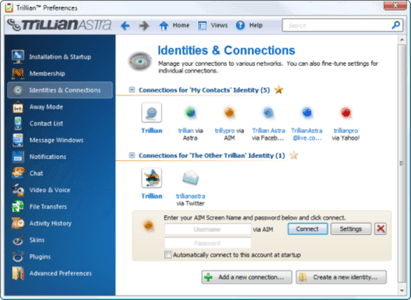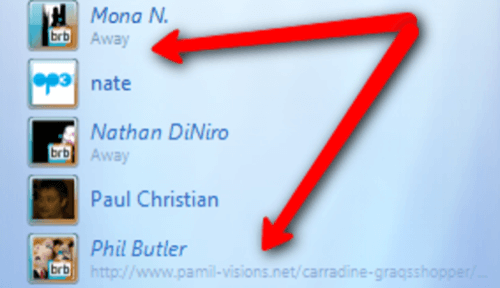Nearly three years ago, internet users were buzzing about the upcoming new version of the multi-network instant messaging program from Trillian, a software application that would be called “Astra.” But as time went on, Trillian just couldn’t deliver. Eventually, we all moved on…to Digsby, to Meebo, and to plain ol’ Google Talk, which we could easily access from our email inboxes.

Then, out of the blue, Trillian Astra emerged into private beta last month, although how “private” a beta is debatable – it seemed anyone asking got an invite. Now, the Trillian blog is announcing that Astra has gone public – no invite code needed.
Yet as the long-anticipated Astra finally emerges, we have to wonder is it “too little, too late” for this company?
What’s to Like in Astra
After years of development, you would expect to be blown away by Astra, wouldn’t you? We might not go that far, but we can say that Astra is a solid multi-protocol IM client. It supports the usual IM networks (Yahoo, Google, ICQ, Windows Live, AOL, Jabber/XMPP) as well as other services like MySpace, Facebook, Skype, and Twitter. You can even use the program to keep tabs on your various email accounts, both web-based and POP3/IMAP.

New to the software are a couple of different reply options – a standard reply and a “quick reply.” You can choose which one you want by clicking the corresponding button on the pop-up notification. A standard reply opens the main chat window while the quick reply opens a text field in the pop-up window where you can type out your message.
The Astra software is extensible, too, and comes pre-loaded with a Widget Gallery where you can pick and choose widgets to add to your contact list. Some of the widgets include a countdown timer, a weather widget, and a flickr widget.
What’s Annoying
Despite having 40 themes to choose from, I just couldn’t get comfortable with Astra’s UI. Your experience may differ. The problem has to do with a lack of contrasting colors in the themes, leaving some text so light, it was nearly impossible to see. The default font size didn’t help either. Other buttons like the dash (-) and the plus sign (+), to collapse or expand windows, were so small that they, too, became nearly invisible.

Another annoyance has to do with email notifications. If you click on the new email pop-ups to read your latest message, Astra opens your inbox in a new browser window…with every pop-up you click, that is. After checking your email a handful of times, you’re left with a crowded web browser filled with inbox tab after inbox tab.
After Three Years, This is All We Get?
The main problem with Astra is not that it’s a bad IM client. It’s solid, it does a good job, and it even has some nifty features to boot like the widgets or the “meta-contact” feature which lets you merge multiple contacts into one for friends that have identities on numerous networks.

The problem with Astra is that after being in development for this long, we expected something downright revolutionary. Something divine. What we got instead was a rather ordinary piece of software that can’t even come close to capturing the excitement we once had as we anxiously awaited its release years ago.
Maybe we’ve outgrown the need for multi-client programs anyway. Really, most of our friends are on Google Chat or Skype these days and those that aren’t are on Twitter and Facebook. It’s not really that much of a hassle to open the appropriate program, or send a tweet when we can’t IM, or even just write on their wall.
In fact, while we waited for Astra, we watched Twitter grow from tiny startup to international sensation. At this point, we’d rather tweet than IM in many cases, and while, yes, we can do that from Trillian, we can do it from a number of other Twitter clients, too. Today, it’s almost like Trillian doesn’t just compete with Digsby and Meebo, but it also has to fight the TweetDecks and Mixeros of the world, too.
In the end, there isn’t anything particularly bad about Astra, there just isn’t anything truly amazing either. We doubt its release will change our current habits, but that’s just us. If you think you’ll use Astra, tell us why in the comments. Or if you feel the same as we do, let us know that as well.

















